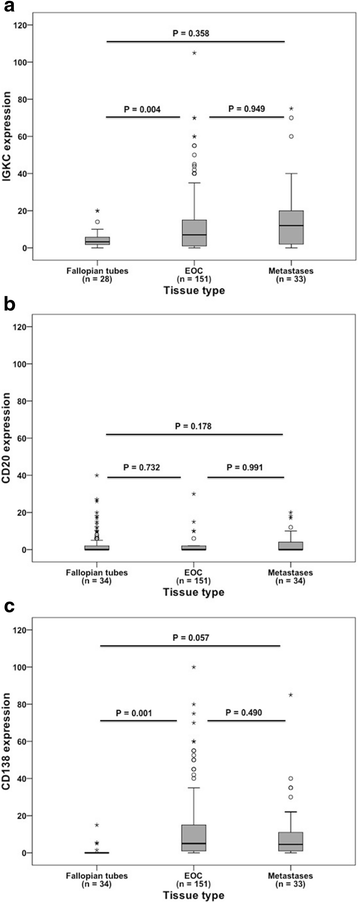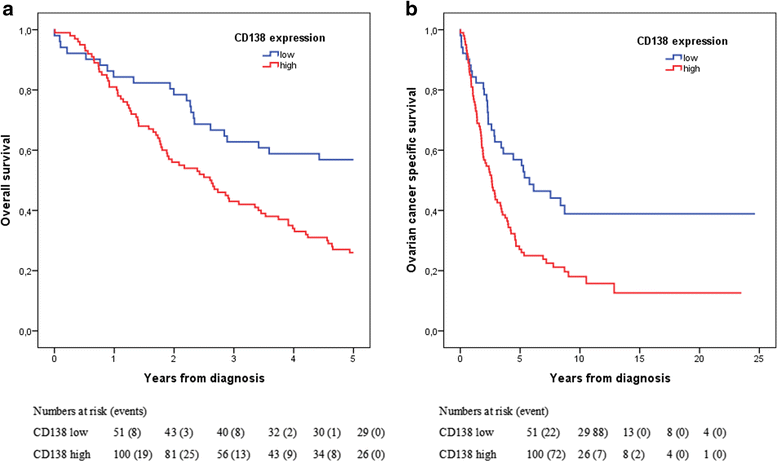Prognostic impact of tumour-associated B cells and plasma cells in epithelial ovarian cancer
- PMID: 27048364
- PMCID: PMC4822228
- DOI: 10.1186/s13048-016-0232-0
Prognostic impact of tumour-associated B cells and plasma cells in epithelial ovarian cancer
Abstract
Background: The critical role of the immune system in controlling cancer progression has become evident and immune modulatory therapy is now approved for clinical use. However, while the majority of studies on the inflammatory tumour microenvironment have focused on the cellular immune response, in particular the prognostic and predictive role of various T cell infiltrates, the role of the humoral immune response in this context has long been overlooked. This study aimed to investigate the clinicopathological correlates and prognostic impact of B cell and plasma cell infiltration in epithelial ovarian cancer (EOC).
Methods: Immunohistochemical expression of immunoglobulin kappa C (IGKC), CD20 and CD138 was analysed in tissue microarrays with tumours from 154 incident cases of EOC from two pooled prospective population-based cohorts. Subsets of corresponding benign-appearing fallopian tubes (n = 38) and omental metastases (n = 33) were also analysed. Kaplan-Meier analysis and Cox regression analysis were used to determine the impact of immune-cell specific IGKC, CD20 and CD138 expression on overall survival and ovarian cancer-specific survival.
Results: High IGKC expression correlated significantly with expression of CD20 (p = 0.001) and CD138 (p = 0.035). Expression of IGKC as well as CD138 was significantly higher in primary tumours than in fallopian tubes (p = 0.004 and p = 0.001, respectively). High CD20 and CD138 expression correlated significantly with high tumour grade (p = 0.032 and p = 0.030, respectively). CD20 and IGKC expression was not prognostic but univariable Cox regression analysis revealed high CD138 expression to correlate with a significantly reduced overall survival (HR = 2.20; 95 % CI 1.34-3.55; p-0.001) as well as ovarian cancer-specific survival (HR = 1.95; 95 % CI 1.28-2.98; p = 0.002). The prognostic impact was independent of established clinical parameters (age, grade, clinical stage) as shown in multivariable analysis (HR = 2.28; 95 % CI 1.39-3.75; p = 0.001).
Conclusions: In conclusion, our results demonstrate that plasma cell infiltration in epithelial ovarian cancer has a significant impact on tumour progression and prognosis. The important role of the humoral immune system merits further study and may be harnessed as immune modulatory strategies in cancer therapy.
Keywords: CD138; CD20; Immunoglobulin kappa c; Ovarian cancer; Prognosis; Syndecan-1.
Figures



Similar articles
-
Prognostic impact of tumour-infiltrating B cells and plasma cells in colorectal cancer.Int J Cancer. 2016 Sep 1;139(5):1129-39. doi: 10.1002/ijc.30138. Epub 2016 May 6. Int J Cancer. 2016. PMID: 27074317
-
Expression and prognostic significance of the polymeric immunoglobulin receptor in epithelial ovarian cancer.J Ovarian Res. 2014 Feb 26;7:26. doi: 10.1186/1757-2215-7-26. J Ovarian Res. 2014. PMID: 24568264 Free PMC article.
-
The prognostic relevance of tumour-infiltrating plasma cells and immunoglobulin kappa C indicates an important role of the humoral immune response in non-small cell lung cancer.Cancer Lett. 2013 Jun 10;333(2):222-8. doi: 10.1016/j.canlet.2013.01.036. Epub 2013 Jan 28. Cancer Lett. 2013. PMID: 23370224
-
miRNA-200a/c as potential biomarker in epithelial ovarian cancer (EOC): evidence based on miRNA meta-signature and clinical investigations.Oncotarget. 2016 Dec 6;7(49):81621-81633. doi: 10.18632/oncotarget.13154. Oncotarget. 2016. PMID: 27835595 Free PMC article. Review.
-
Immunity of human epithelial ovarian carcinoma: the paradigm of immune suppression in cancer.J Transl Med. 2013 Jun 13;11:147. doi: 10.1186/1479-5876-11-147. J Transl Med. 2013. PMID: 23763830 Free PMC article. Review.
Cited by
-
Preclinical and Clinical Immunotherapeutic Strategies in Epithelial Ovarian Cancer.Cancers (Basel). 2020 Jul 2;12(7):1761. doi: 10.3390/cancers12071761. Cancers (Basel). 2020. PMID: 32630708 Free PMC article. Review.
-
B cell deficiency promotes the initiation and progression of lung cancer.Front Oncol. 2022 Sep 29;12:1006477. doi: 10.3389/fonc.2022.1006477. eCollection 2022. Front Oncol. 2022. PMID: 36249034 Free PMC article.
-
The Tumor Microenvironment of Epithelial Ovarian Cancer and Its Influence on Response to Immunotherapy.Cancers (Basel). 2018 Jul 24;10(8):242. doi: 10.3390/cancers10080242. Cancers (Basel). 2018. PMID: 30042343 Free PMC article. Review.
-
A minority-group of renal cell cancer patients with high infiltration of CD20+B-cells is associated with poor prognosis.Br J Cancer. 2018 Oct;119(7):840-846. doi: 10.1038/s41416-018-0266-8. Epub 2018 Oct 8. Br J Cancer. 2018. PMID: 30293996 Free PMC article.
-
Chemokines and their Receptors: Multifaceted Roles in Cancer Progression and Potential Value as Cancer Prognostic Markers.Cancers (Basel). 2020 Jan 24;12(2):287. doi: 10.3390/cancers12020287. Cancers (Basel). 2020. PMID: 31991604 Free PMC article. Review.
References
-
- Lynch TJ, Bondarenko I, Luft A, Serwatowski P, Barlesi F, Chacko R, et al. Ipilimumab in combination with paclitaxel and carboplatin as first-line treatment in stage IIIB/IV non-small-cell lung cancer: results from a randomized, double-blind, multicenter phase II study. J Clin Oncol. 2012;30(17):2046–54. doi: 10.1200/JCO.2011.38.4032. - DOI - PubMed
Publication types
MeSH terms
Substances
LinkOut - more resources
Full Text Sources
Other Literature Sources
Medical
Miscellaneous

